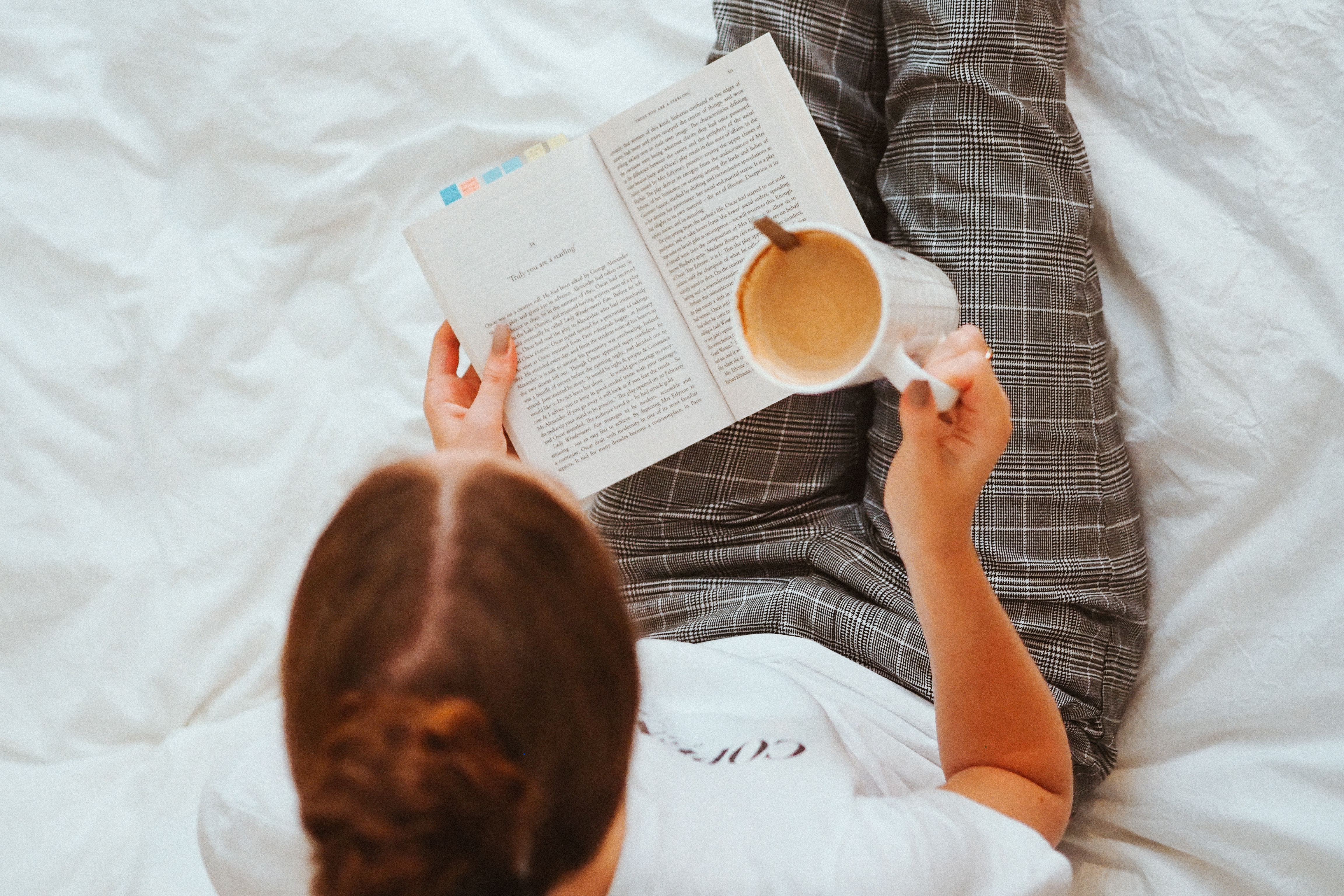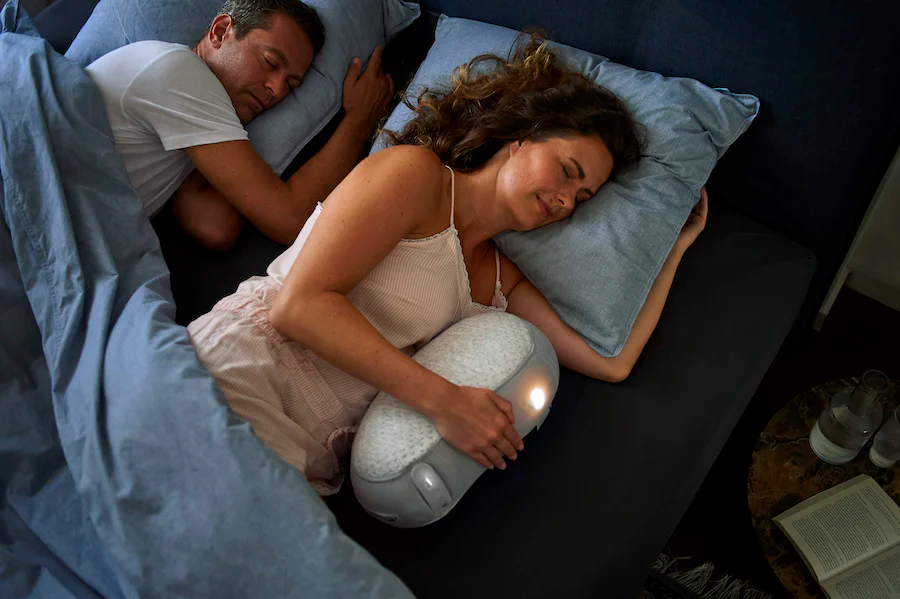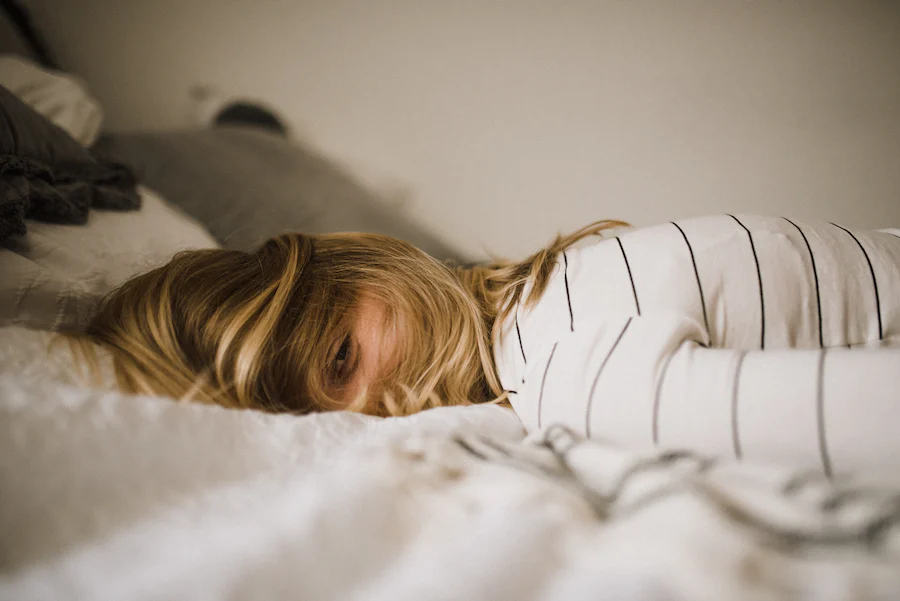Insomnia, the persistent inability to fall asleep or stay asleep, is a challenge faced by millions around the world. Sleepless nights, tossing and turning, and the relentless search for a good night's sleep can be not only physically exhausting but emotionally draining as well.
Insomnia affects our mood, productivity, and overall quality of life. The quest for a quick and effective solution to combat this sleepless enemy has become a priority for many.
While long-term solutions are vital for addressing the root causes of insomnia, sometimes you need a quick remedy to help you get through the night.
Here’s a simple yet powerful technique that’ll help you cure insomnia in just 12 minutes!

Breathing Techniques
Breathing techniques offer a simple yet highly effective way to combat insomnia and find swift relief.
Deep Breathing
By focusing on slow, deep breaths, you can reduce stress and anxiety, creating the ideal conditions for sleep. As you inhale, feel your abdomen rise, and with each exhale, let go of tension.
The power of deep breathing lies in its ability to trigger the body's relaxation response, slowing the heart rate and calming the nervous system. It's a straightforward practice that can be performed anytime, anywhere, making it an invaluable ally in your battle against insomnia.
Guided Meditation
Guided meditation, another breathing technique, merges relaxation and mental focus to guide you into peaceful slumber. By selecting a meditation specifically designed for sleep, you create a tranquil environment in which to unwind.
As you listen to the soothing voice and imagery of the meditation, your thoughts are gently directed away from the stressors of the day. This method helps quiet a busy mind and instills a sense of serenity, paving the way for a night of restful sleep.
The Benefits of Meditative Breathing
The advantages of meditative breathing extend far beyond the immediate relief it provides. While it is a potent tool for alleviating insomnia, it also has numerous long-term benefits.
Meditative breathing reduces stress, leading to a calm state of mind and better sleep quality. By fostering emotional regulation, it aids in managing anxiety and restlessness.
Additionally, this practice sharpens mental clarity, enhancing focus and overall well-being. Integrating meditative breathing into your nightly routine can usher in a transformation of your sleep patterns, promising both instant relief and lasting improvements in sleep quality.
Creating a Peaceful Environment
A quiet sleep environment is an invaluable asset when it comes to conquering insomnia and achieving a restful night's sleep. Noise disturbances, whether they stem from street traffic, household sounds, or even a partner's snoring, can be profoundly disruptive to your sleep patterns.
Such disturbances can pull you out of deeper sleep stages and hinder your ability to fall back asleep. This is why it's essential to recognize the pivotal role of a peaceful sleep environment.
To address this issue, start by reducing any noise sources in your bedroom, such as keeping doors and windows closed, using heavy curtains to block outdoor sounds, and discussing snoring concerns with your partner. Achieving a quiet environment sets the stage for undisturbed rest.
Sound Machines and Relaxation Apps
When a perfectly silent sleep environment isn't feasible, sound machines and relaxation apps come to the rescue. These tools are specifically designed to create soothing soundscapes that mask disruptive noises and help you drift into tranquil sleep.
Sound machines offer a range of options, from white noise to nature sounds like ocean waves, birdsong, or rainfall. Likewise, relaxation apps provide a plethora of sound choices, often customizable to your preferences.
They can be conveniently played through your smartphone or a dedicated device. The steady, calming sounds emitted by these devices can lull your mind into a state of relaxation, effectively drowning out external disruptions.
Exploring Soothing Sounds
The world of soothing sounds is vast and diverse, allowing you to tailor your sleep environment to your personal preferences. While some individuals find solace in the gentle hum of white noise, others may prefer the serenity of a forest's rustling leaves or the melodic tunes of classical music.
It's crucial to experiment with various types of sounds to determine what resonates most with your sense of tranquility. This might involve trying out different soundscapes until you discover the perfect auditory backdrop that eases your mind into a peaceful state.
The key is to explore and find the most relaxing sounds that resonate with your unique sleep sanctuary, enhancing the quality of your sleep and providing you with the instant relief you seek for a restful night.
Reducing Blue Light Exposure
Blue light, emanating from digital screens and energy-efficient light bulbs, is a modern sleep disruptor that has gained widespread recognition.
It holds a significant impact on our circadian rhythms by suppressing the production of melatonin, a hormone crucial for regulating sleep-wake cycles. Exposure to blue light in the evening can trick our bodies into thinking it's daytime, making it difficult to wind down and fall asleep.
The result is often insomnia or disrupted sleep patterns. Understanding the detrimental effects of blue light on our sleep is the first step in seeking instant relief from sleepless nights.
Strategies to Minimize Blue Light Exposure
To mitigate the influence of blue light on sleep, a few straightforward strategies can be employed. One of the most effective methods is setting digital curfews by limiting screen time in the hour or two before bedtime.
This practice allows your body to naturally wind down and adjust to the impending sleep period. Additionally, the use of warm, dim lighting in the evening can significantly reduce blue light exposure.
This includes switching to incandescent or warm LED bulbs and avoiding the harsh glare of computer or smartphone screens. By adopting these strategies, you can diminish the adverse effects of blue light and prepare your body for a peaceful night's rest.
Filtering Blue Light
For those who find it challenging to avoid screens before bedtime, blue light filters and glasses offer an effective solution. Blue light filters are available for various digital devices and can be installed to reduce the amount of blue light emitted.
These filters alter the screen's color temperature, making it warmer and less stimulating to the brain. Alternatively, blue light-blocking glasses can be worn when engaging with screens.
They work by filtering out the harmful blue light wavelengths, allowing you to enjoy your devices without the detrimental impact on your sleep.
By integrating blue light filters or glasses into your routine, you can maintain your digital lifestyle while preserving your sleep quality, thus achieving the instant relief you seek for your insomnia.

Reading Before Bed
Reading before bed is a cherished and time-tested ritual for many, but its benefits extend beyond simply enjoying a good book. Engaging in a calming reading session before sleep can be a powerful tool to promote better slumber.
As you immerse yourself in a captivating story or informative text, your mind naturally begins to unwind, shifting its focus from the stresses of the day to the world within the pages. This transition into a different mental space aids in relaxation and eases the journey into sleep.
Furthermore, the act of reading provides a gentle break from screen time, reducing exposure to the sleep-disrupting effects of blue light emitted by electronic devices.
Ideal Reading Conditions
To make the most of your bedtime reading routine, it's essential to create ideal reading conditions in your sleep environment. Ensure that your reading area is well-lit, but not overly bright, as this strikes a balance between readability and a soothing ambiance.
Dim, warm lighting is preferable to harsh, cool tones. Additionally, make yourself comfortable with supportive pillows and a cozy blanket. Positioning yourself in a way that minimizes strain on your neck or back is essential to enjoy uninterrupted reading.
Creating a tranquil reading environment sets the stage for a peaceful transition into slumber.
Choosing the Right Reading Material
The choice of reading material also plays a significant role in the success of your pre-sleep reading routine. Opt for content that is engaging but not overly stimulating.
Thrillers or action-packed narratives may keep you on the edge of your seat, making it challenging to unwind. Instead, consider genres like fiction, self-help, or non-fiction that offer a balance of interest and relaxation.
Many individuals find that re-reading familiar books can be especially soothing, as there's no anticipation of plot twists. Personal preference is key when selecting your bedtime reading material, as it should cater to your unique tastes and needs.
By recognizing the calming impact of reading before bed, optimizing your reading environment, and carefully selecting your reading material, you can make this ritual an effective tool for achieving a good night's sleep.
It's a practice that promises to provide the instant relief you seek from insomnia while enhancing your overall sleep quality.

Herbal Tea
The relationship between caffeine and sleep is well-established. Caffeine, a stimulant found in coffee, tea, and many soft drinks, can have a profound impact on your ability to fall and stay asleep. It works by blocking adenosine, a neurotransmitter responsible for promoting sleep and relaxation.
As a result, consuming caffeine, especially in the late afternoon or evening, can lead to disrupted sleep patterns and even insomnia. Recognizing the link between caffeine and sleep is the first step in using herbal tea to alleviate sleep troubles.
Sleep-Enhancing Herbal Teas
Herbal teas, on the other hand, offer a delightful and caffeine-free solution to sleep woes. Various herbs and botanicals have been celebrated for their soothing and sleep-enhancing properties.
Chamomile, valerian root, lavender, and lemon balm are just a few examples of the herbs commonly used in sleep-promoting teas. These herbs contain compounds that induce relaxation, reduce anxiety, and prepare the body for rest.
Sipping on a warm cup of herbal tea before bedtime provides a comforting routine and offers a gentle nudge toward sleep. The absence of caffeine ensures that your tea won't interfere with your ability to doze off.
Herbal Tea in Your Nightly Routine
The incorporation of herbal tea into your nightly routine can be a simple yet powerful practice to counter insomnia. To make the most of this remedy, designate a specific time for your nightly tea ritual. This can serve as a signal to your body and mind that it's time to wind down and prepare for rest.
The act of brewing tea, savoring its aroma, and slowly sipping it can be a meditative process, helping you to detach from the stresses of the day.
As you become accustomed to this soothing routine, your body will learn to associate it with sleep, making it easier to doze off and experience the instant relief you seek for a good night's rest.
Incorporating caffeine-free herbal tea into your nightly routine can provide a calming and caffeine-free solution to insomnia.
By understanding the relationship between caffeine and sleep, selecting sleep-enhancing herbal teas, and establishing a tea-drinking ritual, you can create a path to better sleep and enjoy the soothing comfort of herbal infusions as an instant remedy for sleepless nights.
Sleep Position and Comfort
Your choice of sleep position has a profound impact on your overall sleep quality and comfort. There are several common sleep positions, including back sleeping, side sleeping, and stomach sleeping, and each has its own set of advantages and drawbacks.
Back sleeping, for instance, is often recommended for spinal alignment, but it may exacerbate snoring for some individuals. Side sleeping can alleviate snoring and sleep apnea but may lead to pressure points on the hips and shoulders.
Stomach sleeping may relieve snoring but can cause neck and lower back strain. Understanding how different sleep positions affect your comfort is the first step in addressing sleep-related discomfort.
Supportive Pillows
Pillows play a crucial role in maintaining proper spinal alignment and ensuring your comfort while you sleep. The choice of pillow largely depends on your preferred sleep position.
For back sleepers, a medium-firm pillow that supports the natural curve of the neck is recommended. Side sleepers benefit from a firmer pillow that keeps the head and neck in alignment with the spine. Stomach sleepers may opt for a softer, thinner pillow to reduce strain on the neck.
Additionally, body pillows can provide support for various sleep positions and alleviate pressure points. Using the right pillows tailored to your sleep position can significantly enhance your comfort during the night.
Investing in a Good Mattress
Your mattress is the foundation of your sleep comfort, and choosing the right one is essential for relieving discomfort and achieving a good night's sleep.
Mattresses come in various materials and firmness levels, and the best choice for you depends on your sleep preferences and any existing discomfort or pain issues.
For example, memory foam mattresses conform to your body's shape, providing pressure point relief. Innerspring mattresses offer a responsive, bouncy feel and can be beneficial for back sleepers. Latex mattresses are hypoallergenic and provide both support and comfort.
Assessing your personal sleep needs and seeking a mattress that aligns with those requirements is key to improving your sleep comfort.
Temperatures for Better Sleep
Temperature plays a pivotal role in sleep comfort. An overheated or too-cold sleep environment can lead to discomfort and disrupted sleep. To ensure an optimal sleep temperature, consider adjusting your room's thermostat, using breathable bedding materials, and optimizing your sleep attire.
Many individuals find that slightly cooler room temperatures, typically around 65°F (18°C), promote better sleep comfort. Moreover, moisture-wicking sheets and breathable fabrics can help manage body temperature and minimize discomfort.
By addressing temperature-related discomfort, you pave the way for more restful sleep.
Recognizing the relationship between sleep position and comfort, the use of supportive pillows, the importance of a comfortable mattress, and managing temperature in your sleep environment, you can make significant strides in achieving instant relief from sleep-related discomfort.
These adjustments contribute to a better night's sleep, making the path to improved sleep quality smoother and more attainable.

Melatonin as a Sleep Aid
Melatonin is a natural hormone produced by the pineal gland in the brain, and it plays a vital role in regulating the body's sleep-wake cycle. Often referred to as the "sleep hormone," melatonin is released in response to decreasing light levels, signaling to the body that it's time to prepare for sleep.
As evening approaches, melatonin levels rise, promoting a state of relaxation and drowsiness, making it easier to fall asleep. Understanding the role of melatonin in your sleep-wake cycle is the first step in harnessing its potential as a sleep aid.
Melatonin Supplements
When using melatonin as a sleep aid, timing is crucial. It's important to take melatonin approximately 30 minutes to an hour before your intended bedtime. This ensures that your body has adequate time to absorb and respond to the hormone's sleep-inducing effects.
Melatonin is available in various forms, including melatonin gummies, pills, and liquid, and the appropriate dosage may vary from person to person. It's advisable to start with a low dose, usually between 0.5 and 3 milligrams, and adjust as needed.
It's essential not to exceed the recommended dosage, as taking excessive melatonin can disrupt your natural sleep-wake cycle. Proper usage and timing can make melatonin products a valuable tool for achieving better sleep.
The Potential Benefits of Melatonin
Melatonin offers several potential benefits for improving sleep. It can be particularly useful for individuals with shift work sleep disorder, jet lag, or delayed sleep phase disorder.
Additionally, melatonin may help people fall asleep faster, reduce the number of awakenings during the night, and improve overall sleep quality. However, it's crucial to consider individual differences and potential side effects.
The Potential Side Effects of Melatonin
Some people may experience dizziness, nausea, or daytime drowsiness when taking melatonin. Long-term effects and safety have not been extensively studied, so it's best to use melatonin as a short-term solution to address specific sleep issues.
As with any sleep aid, it's advisable to consult with a healthcare professional before adding melatonin to your sleep routine to ensure that it's the right choice for your specific needs.
By understanding melatonin's role in sleep regulation, following proper usage and timing, and considering the potential benefits and individual considerations, you can harness the potential of melatonin as a sleep aid.
This natural hormone has the capacity to provide instant relief from sleep difficulties and lead you to a more restful night's sleep.

Over-the-Counter (OTC) Medications
Over-the-counter (OTC) sleep aids offer a convenient and accessible solution for short-term relief from sleep difficulties. These medications are designed to help you fall asleep or stay asleep, making them a valuable tool for occasional insomnia or sleep disturbances.
OTC sleep aids typically come in various forms, including capsules, tablets, and liquids, and are available without a prescription. While they can be effective for providing instant relief from sleep problems, it's important to use them as intended—on a short-term basis.
Relying on OTC sleep aids for an extended period may lead to dependence or mask underlying sleep issues. Recognizing the temporary nature of OTC sleep aids is essential for making them a useful part of your sleep strategy.
Common Ingredients in OTC Sleep Medications
OTC sleep aids contain a range of active ingredients, each with its own mechanism for inducing sleep. Common ingredients include antihistamines like diphenhydramine and doxylamine, as well as melatonin and valerian root.
It's important to read labels and understand the potential side effects and interactions of these ingredients before using them. Precautions should be taken, especially if you have underlying health conditions, are pregnant, or are taking other medications.
OTC sleep aids may cause drowsiness the next day, so they should be used with caution if you need to be alert in the morning. Additionally, it's advisable not to mix OTC sleep aids with alcohol, as it can intensify the sedative effects and pose risks to your health.
Consulting Healthcare Professionals
Before choosing an OTC sleep aid, it's a wise idea to consult with a healthcare professional. They can provide guidance on the most suitable OTC options based on your specific sleep issues and medical history. They can also help you navigate potential interactions with other medications you may be taking.
If you don't want to take OTC sleep aids, but would still like a product to help you fall asleep a bit easier, consider Edobles' sleep edibles. Our sleep products are a safe, natural, and non-habit-forming approach to improving sleep quality.
Understanding the role of OTC sleep aids, recognizing the importance of short-term use, being aware of common ingredients and precautions, and seeking guidance from a healthcare professional can help you find instant relief from sleep difficulties while maintaining your overall sleep health.
When to Seek Professional Help
Chronic insomnia is characterized by persistent difficulty falling asleep, staying asleep, or experiencing non-restorative sleep for an extended period, typically lasting three months or more. Recognizing chronic insomnia is a crucial first step in determining when to seek professional help.
If you find that sleep difficulties have become a regular occurrence and are significantly affecting your daily life, it's an indication that you may be dealing with chronic insomnia. Symptoms often include daytime fatigue, irritability, poor concentration, and a reduced quality of life.
Chronic insomnia can result from various causes, including medical conditions, psychiatric disorders, and lifestyle factors. Identifying the duration and impact of your sleep troubles is vital for knowing when it's time to consult a healthcare professional.
Potential Health Risks of Long-Term Insomnia
Prolonged and untreated insomnia can have serious health consequences. It's not merely a matter of feeling fatigued or having low energy during the day.
Long-term insomnia has been linked to an increased risk of various medical conditions, including hypertension, cardiovascular diseases, diabetes, and mood disorders such as depression and anxiety. It can also impair cognitive function, making it difficult to focus, concentrate, and make decisions.
Chronic insomnia can disrupt your immune system, making you more susceptible to illnesses. Additionally, it may lead to an increased risk of accidents and injuries due to impaired alertness and coordination.
Recognizing the potential health risks associated with long-term insomnia underscores the importance of seeking professional help.
Treatment Options
When you suspect chronic insomnia or have been struggling with sleep difficulties for an extended period, seeking medical advice is essential.
Healthcare professionals, including primary care physicians and sleep specialists, can help identify the underlying causes of your insomnia and develop a tailored treatment plan.
Treatment options may include cognitive-behavioral therapy for insomnia (CBT-I), medications, lifestyle modifications, and addressing any coexisting medical or psychiatric conditions.
By reaching out to a healthcare provider, you can receive expert guidance and access effective interventions to address your chronic insomnia, minimize potential health risks, and regain restful sleep.
Recognizing chronic insomnia, understanding the potential health risks of long-term insomnia, and taking the step to seek medical advice and explore treatment options are crucial for addressing sleep issues that have persisted over time.

Conquering Insomnia and Improving Sleep Quality
From deep breathing and guided meditation to creating a peaceful sleep environment, reducing blue light exposure, and exploring herbal tea, these approaches provide a diverse toolkit for improving your sleep quality.
Struggling with sleep difficulties can be both physically and emotionally taxing. However, it's important to remain hopeful and motivated on your journey to better sleep. Consistency and patience are key, as improving sleep often involves adopting new habits and making gradual changes.
Embrace the power of experimentation and customization, as what works best for one person may not be the same for another. By persistently implementing the strategies outlined in this guide, you can significantly boost your sleep quality and find the relief you seek.
While self-help strategies can be incredibly effective, it's also crucial to recognize the role of healthcare professionals in addressing chronic and complex sleep issues.
The path to better sleep is within reach. By following the insights and strategies presented, you can improve your sleep quality and conquer insomnia.










